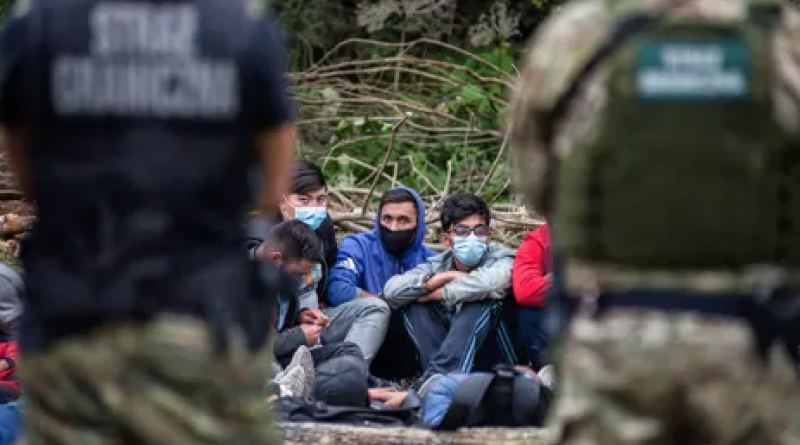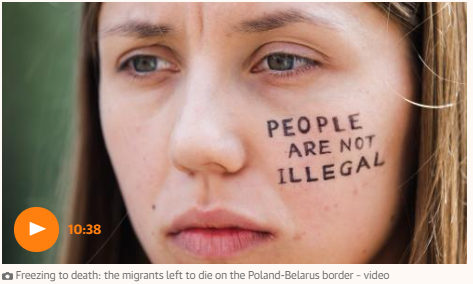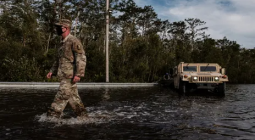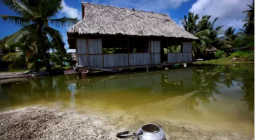Op - Dark things are happening on Europe’s borders. Are they a sign of worse to come?

With a disregard for people’s lives, countries from the UK to Poland are toughening up, as if in preparation for climate displacement.
It is bad enough when states break their own rules and mistreat people – but it’s when they start to change the rules that we really need to worry. Three recent stories, from three different corners of Europe, suggest that governments are crossing a new threshold of violence in terms of how they police their borders. These developments are harmful in their own right, but they also set a disturbing precedent for how countries in rich parts of the world might deal with future displacements of people – not just from war and persecution, but from the climate crisis as well.
In the UK, the Home Office has quietly tried to amend its draconian nationality and borders bill, currently at committee stage, by introducing a provision that gives Border Force staff immunity from prosecution if they fail to save lives at sea. Priti Patel, the home secretary, claims this is an essentially benevolent measure: if boats in the Channel are turned around, it will eventually stop people attempting the dangerous trip in the first place. In fact, it undermines a key principle of international maritime law that makes it a duty to rescue people in distress.
In Poland, the government has just passed an emergency law allowing authorities to turn back refugees who cross into the country “illegally”. It is the latest development in a diplomatic standoff with Belarus, which has cynically been encouraging people from Iraq, Iran and parts of Africa to cross into the EU, in response to sanctions imposed on it earlier this year. Poland’s hardline response leaves many people trapped in the no man’s land between the two countries. Aid agencies warn of a looming humanitarian crisis as winter sets in; at least eight people have died this year so far, mostly from hypothermia.

In south-eastern Europe, an international team of investigative journalists have revealed that Croatia and Greece are using a “shadow army”, balaclava-clad plainclothes units linked to those countries’ regular security forces, to force people back from their borders. In Croatia, these units have been filmed beating people with clubs at the border with Bosnia. In Greece, they are accused of intercepting boats in the Aegean and setting the passengers adrift on life-rafts in Turkish waters. (Croatia has promised to investigate reports of abuse, while Greece denies the practice.) Just as shocking as the claims themselves is the fact that the revelations have largely been met with a shrug of indifference by EU officials, whose funding helps prop up border defences in both countries. Twelve member states are even demanding that the EU adjusts its rules so that it can finance “further preventive measures”, including walls and fences, at its external borders.
Together, these stories suggest that the “push-back” – the forcing away of migrating people from a country’s territory, even if it places them in harm’s way or overrides their right to asylum – is becoming an entrenched practice. Once something that would take place largely in the shadows, it is being done increasingly openly, with some governments trying to find ways to make the practice legal. The UK’s proposal has been strongly criticised by the UN refugee agency, UNHCR, whose representative said it would “unavoidably” put lives at risk.
This is not only a problem for today: it is a dress rehearsal for how our governments are likely to deal with the effects of the climate crisis in years to come. Predictions about climate-related migration are notoriously vague, and prone to hyperbole, but a new report by the World Bank projects that 216 million people could be displaced within their own countries by water shortages, crop failure and rising sea levels by 2050. Some people may well end up moving further if they face poor economic prospects or conflict and instability at home. In April, the US vice-president, Kamala Harris, said that drought and “extensive storm damage because of extreme climate” were partly behind increased migration from Central America.
Unfortunately, many of our politicians are primed to see displacement first and foremost as a civilisational threat. That was the logic of Boris Johnson’s comments ahead of the launch of Cop26 in Glasgow, when he claimed – incorrectly – that “uncontrolled immigration” was responsible for the fall of the Roman empire, and that a similar fate awaits the world today. In this telling, an environmental disaster that affects us all is transformed into a question of how the wealthy and powerful can preserve their privileges.
Richer parts of the world have already begun to militarise their borders, a process that has accelerated in response to the refugee movements of the past decade. In this, they are backed up by a burgeoning border security industry. A recent report by the Transnational Institute warns of what it calls “the border-industrial complex”, a growing multibillion dollar industry that ranges from security infrastructure to biometrics and artificial intelligence. The global market in fences, walls and surveillance alone is projected to be worth $65-$68bn by 2025.
This, however, is a false kind of security. Restrictive and violent border control just makes the societies that wield it more authoritarian – and it doesn’t stop people moving entirely, either. What it does is force people to make more dangerous journeys, becoming even greater targets for xenophobic backlash. Countries or regions that are seen as desperate to keep people out become targets for unscrupulous neighbours who want to use the issue to exert political pressure. The ultimate result, as we are continuing to see at Europe’s borders, is a callous disregard for life.
What’s required, instead – beyond action to reduce emissions – is a plan to help people adapt to changing living circumstances and reduce global inequality, along with migration policies that recognise the reality of people’s situations. Last year, the UN human rights committee ruled that governments should not return people to countries where their safety would be directly threatened by the climate emergency. As it stands, however, there is no proper legal framework for protecting people displaced for environmental reasons. A major new US study commissioned by the Biden administration recommends new laws to protect climate migrants, but it is strikingly light on detail.
The next few years are likely to mark a turning point in the way our governments respond to displacement. Either they work together to build a system that protects people’s lives and dignity, and that can adapt to the changing realities of the 21st century, or their borders will continue to harden, at considerable human cost. If we want to avoid the latter, then now is the time to challenge the violent logic of the push-back, before it becomes written into our laws.
-
Daniel Trilling is the author of Lights in the Distance: Exile and Refuge at the Borders of Europe and Bloody Nasty People: the Rise of Britain’s Far Right
8 November 2021
The Guardian




